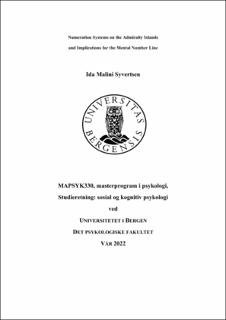Numeration Systems on the Admiralty Islands and Implications for the Mental Number Line
Master thesis
Permanent lenke
https://hdl.handle.net/11250/2998013Utgivelsesdato
2022-05-19Metadata
Vis full innførselSamlinger
- Master theses [60]
Sammendrag
Over the last decades there has been growing interest in the relationship between cognition and culture. One question that has yet to be answered on this topic is the role counting systems have for cognition. Counting systems vary between cultures and may influence the mental representation of numbers. On that note, some authors argue that numbers map onto a mental number line that is used when dealing with numbers. This thesis gives an overview of numerals for the Admiralty Islands, an Island group located outside of Papua New Guinea. It analyzed the counting systems and their implications for the mental number line. The aim of the study was to investigate the characteristics of number systems on the Admiralty Islands in order to investigate how these characteristics may affect the mental number line. The thesis took an explorative and theoretical method approach where numerical data on the languages of the Admiralty Languages were gathered from literature. The results from the data collection suggested that the counting systems on the Admiralty Islands facilitat a linear, two- dimensional mental number line ranging from 1 to 100. It was concluded that various cultural aspects could be influential in shaping the mental number line. The predictions made may be used as a basis for further empirical research on mental representations of numbers.
